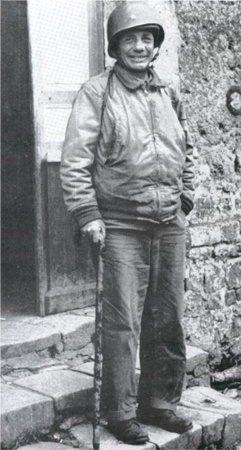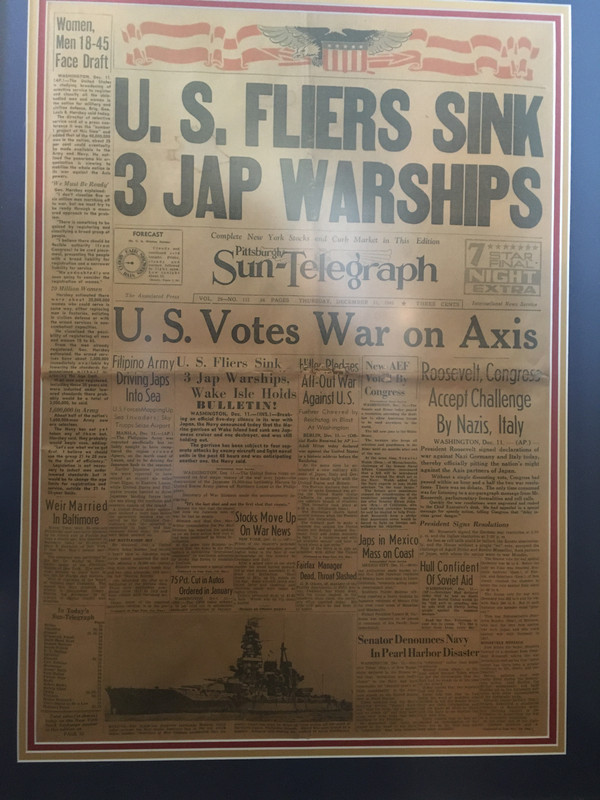SIGforum.com  Main Page
Main Page  The Lounge
The Lounge  “How the U.S. Won World War II Without Invading Japan” (anniversary of Tokyo firebombing)
“How the U.S. Won World War II Without Invading Japan” (anniversary of Tokyo firebombing)
 Main Page
Main Page  The Lounge
The Lounge  “How the U.S. Won World War II Without Invading Japan” (anniversary of Tokyo firebombing)
“How the U.S. Won World War II Without Invading Japan” (anniversary of Tokyo firebombing)Page 1 2
Go  | New  | Find  | Notify  | Tools  | Reply  |  |
| Freethinker |
The Wall Street Journal opinion piece. =========================== By Warren Kozak The U.S. entered World War II in 1941. Yet American planes couldn’t dent a roof in Japan until 1945. The 1942 Doolittle raid, with its 16 bombers that took off from carriers, showed great ingenuity and bravery. But it had zero impact on Japan’s ability to make war. The raid was designed to boost morale after Pearl Harbor. When the U.S. didn’t follow up with more attacks, the Japanese believed their homeland was invulnerable to enemy bombs because of the emperor’s divine presence. That hubris ended 75 years ago Monday with an event that set in motion the eventual U.S. victory. First, a little more history: The U.S. could reach Japan only after the Marines took the Mariana Islands at great cost in 1944. The largest airports in the world were built within months and filled with new, modern B-29 bombers. The B-29 was a marvel and the greatest expense of the war at $3 billion, compared with $2.4 billion for the Manhattan Project. Each plane was three times the size of the next-largest bomber, the B-17. The B-29 could fly 3,700 miles and cruise at an altitude high enough to elude antiaircraft fire. But the B-29 ran into a problem during its first mission over Japan— huge winds up to 200 miles an hour. The jet stream rendered it impossible for bombs to hit targets. Hap Arnold, head of the Army Air Force, turned to his youngest general, 38-year-old Curtis LeMay, who didn’t fit the profile of the glamorous flyboy. LeMay was slightly overweight, surly and taciturn. Most people found him frightening. He was a lieutenant in 1940 but rose out of obscurity to become the most innovative problem solver in bomber command. LeMay also insisted on flying the lead bomber on every dangerous mission. He was also the only U.S. general in the war who fought in front of his troops—a case study in military leadership. LeMay approached the jet-stream dilemma like the engineer he was. On the night of March 9, 1945, he sent 346 B-29s to Tokyo. In a radical departure from normal operations, he ordered the planes to fly low—5,000 feet—and not in formation, but in a single-file line. The planes would drop incendiaries instead of impact bombs. The crews protested, assuming they would be destroyed by the flak. But LeMay believed the crews could survive because the Japanese wouldn’t see this coming. He was right. With minimum loss to the U.S., the incendiaries started a firestorm that burned down more than 16 square miles of Tokyo. The firestorm left more than a million homeless and killed an estimated 100,000 men, women and children. The Japanese were as surprised as they were devastated. More people died during that 24-hour period than perished five months later in either Hiroshima or Nagasaki. If this sounds shocking to contemporary ears, consider the context. An estimated 15 million to 17 million Asian civilians were killed—Chinese, Koreans, Filipinos and those from every other country Japan conquered. Like their German allies, the Japanese adopted a sense of triumphal racial superiority. Many of their victims were killed in the most brutal, medieval ways. An average of 250,000 people were dying throughout Asia every month in the first half of 1945. As Americans approached the mainland, the Japanese fought even more ferociously on Iwo Jima and later Okinawa. The war in the Pacific was turning into an out-of-control bloodbath. The only way to stop this mass death—and prevent a prolonged guerrilla war following the largest invasion in history—was to force the empire to surrender by destruction from the air. The U.S. would have to firebomb 64 Japanese cities, capped off by the two atomic bombs in August 1945, to end World War II. In the tragic calculus of war, it took the deaths of untold numbers of human beings to save the lives of even more. These are brutal realities few people today can imagine, let alone confront. Sept. 2 will mark the 75th anniversary of the Japanese surrender on the USS Missouri. That happened without an invasion of the Japanese mainland. Imagine Iwo Jima times 100 or even 1,000. At least a million American servicemen and many more millions of Japanese lived full lives thanks to the terrible and tragic—but necessary—events that began on March 9, 1945. Mr. Kozak is author of “LeMay: The Life and Wars of General Curtis LeMay.” LINK ► 6.0/94.0 To operate serious weapons in a serious manner. | ||
|
| Member |
That article is fully on the mark. Some innocent/stupid people condemn the US for using nuclear weapons, but the firebombing of Tokyo was more devastating and individually more painful than the A-bombs. I did not know about 250,000 deaths a months in Asia, that is terrible. The Japanese did kill about 1 million individuals building the Siam-Burma railway (Bridge of the River Kwai). -c1steve | |||
|
Step by step walk the thousand mile road |
Except for one statement:
Brigadier General Theodore Roosevelt, Jr., angina, arthritis, and a badly FUBAR'd knee landed in the first wave on Utah Beach, discovered that a navigation error had the landing force astride only one causeway leading inland, and made the correct decision "We're starting the war from right here." Roosevelt was the only general on D-Day to land by sea with the first wave of troops. At 56, he was the oldest man in the invasion, too. Years later, General of the Army Omar Bradley was asked to name the single most heroic action he had ever seen in combat. He replied, "Ted Roosevelt on Utah Beach." This was in addition to his service in the First World War, during which he was wounded by both gas and shrapnel, and his service in North Africa, where he clashed with both Patton and Bradley. Brigadier General Roosevelt was later awarded the Medal of Honor for his decision on D-Day morning, but it was posthumous, as he died of a heart attack before being informed of the honor he so rightly deserved. Nice is overrated "It's every freedom-loving individual's duty to lie to the government." Airsoftguy, June 29, 2018 | |||
|
| Get my pies outta the oven!  |
After looking this guy up, I wonder if the General Waverly character in the movie White Christmas was based off him? Brigadier General Theodore Roosevelt:  Major General Tom Waverly (White Christmas):  | |||
|
| Lead slingin' Parrot Head |
A lesson that seems to be lost on many today...even when considering today's foreign policy. Sigfreund, another very interesting and poignant article...thank you for posting it. | |||
|
Member |
I made the mistake of making that point once on YouTube a long time ago and was blasted by the “University of YouTube” commenters. ——————————————— The fool hath said in his heart, There is no God. Psalm 14:1 | |||
|
| semi-reformed sailor |
This is how wars are won. Kill enough of them that they say,”man we may have fucked up”, and keep on killing them until they surrender. Not trying to win hearts. Completely destroying resistance and dominating the enemy. Thank God our grandfathers had the wherewithal to do what needed to be done. "Violence, naked force, has settled more issues in history than has any other factor.” Robert A. Heinlein “You may beat me, but you will never win.” sigmonkey-2020 “A single round of buckshot to the torso almost always results in an immediate change of behavior.” Chris Baker | |||
|
| SIG's 'n Surefires |
I, for one, am glad they made those hard decisions. My Dad was in LeHarve transitioning from the ETO to the PTO. He fully expected to not come home. "Common sense is wisdom with its sleeves rolled up." -Kyle Farnsworth "Freedom of Speech does not guarantee freedom from consequences." -Mike Rowe "Democracies aren't overthrown, they're given away." -George Lucas | |||
|
Member |
LeMay occupies an important part in American history. Decades ago, I read Mission with LeMay: My story. It was at or near the top of the list of the longest books I've ever read but it was fascinating reading. My take was that LeMay was one of those rare people who come along at the right place and time and whose sheer force of personality, innovative ideas and dogged perseverance allows them to mold history. His subordinates probably often felt a sense of dread working for him but I imagine that was balanced with an admiration, perhaps grudging, for what he was able to accomplish. Kozak's book may be worth a look. Thanks for posting. | |||
|
| Member |
When I was in the USAF, there were two separate air forces. USAF. And SAC. And SAC was LeMay. End of Earth: 2 Miles Upper Peninsula: 4 Miles | |||
|
| Member |
 My grandpa bought a guy a beer for this newspaper back in the 60s, it's a prized possession of mine now. The Japanese were ruthless during the War and got exactly what was coming to them. | |||
|
| No double standards |
It took the firebombing of Tokyo, and then a somewhat proportional disaster in Hiroshima, then Nagasaki, until the Japanese gov't realized there was no winning game plan. All in all, the three disasters most likely saved more Japanese lives than they took. "Liberty lies in the hearts of men and women. When it dies there, no constitution, no law, no court can save it....While it lies there, it needs no constitution, no law, no court to save it" - Judge Learned Hand, May 1944 | |||
|
Member |
My uncle was a 19 year old corporal on a troop ship that had already headed out to stage for the invasion of Japan. My two other uncles had been in Europe since the bocage through to the end and say they expected to have to go to Japan. My home town (Presque Isle, ME) had already given a lot, would give more in Vietnam (my dad's class). Yeah, brutal as it was it was the hard and right thing to do. “Forigive your enemy, but remember the bastard’s name.” -Scottish proverb | |||
|
| Cogito Ergo Sum |
My father was a navigator in one of the B-29’s on that mission to Tokyo. He didn’t talk much about all the missions he flew over Japan. He was on Tinian and told us about the delivery of the A-bombs. My mother still has his diary and I will read sometime. | |||
|
| Donate Blood, Save a Life!  |
It wasn't just Tokyo, Hiroshima, and Nagasaki; about 60 Japanese cities were bombed between the Tokyo attack and the dropping of the atomic bombs in the summer. Estimates are that around 330,000 civilians were killed in the series of attacks (including 66,000 to 80,000 at Hiroshima and 40,000 to 100,000 at Nagasaki) and over 470,000 wounded, but that's what it took to get the Japanese high command to realize that they weren't going to win. While the attacks killed so many people, they also made millions homeless, destroyed hundreds of factories supporting the Japanese war effort, disrupted other factories' abilities to produce products and munitions due to the number of missing workers, and slowly broke the Japanese morale. The Japanese government could see (1) that they couldn't effectively protect their homeland from the attacks and (2) that the bombings were causing cumulative damage from which they could not recover. Still, they refused to surrender because they felt their people would fight on for their love of the emperor like on Iwo Jima and Okinawa, which left us no choice when it came to the decision whether to use the atomic bombs. As Scoutmaster said, that decision ultimately saved more Japanese lives than would have been lost in the invasion, but it also saved untold numbers of American lives. *** "Aut viam inveniam aut faciam (I will either find a way or make one)." -- Hannibal Barca | |||
|
| Go ahead punk, make my day |
Japan got exactly what was coming to them for their deceitful actions at Pearl Harbor and their savagery throughout Asia & the Pacific. There are plenty of examples already given, but the "Rape of Nanking" is another one to mention. The only thing the Japanese Government would understand is death up until complete surrender. The US firebombing and atomic attacks against Japan were simply their just desserts. | |||
|
| Freethinker |
In the first few comments to the original WSJ article that I read were a couple of claims that the Japanese didn’t surrender because of the bombing, but rather because of the entry of the Soviet Union against them. There are a couple/three reasons I would be skeptical of that idea, but in any case it’s not a claim I’ve ever seen in any of the many histories I’ve read. Is this something that’s now being taught by the leftists who dominate all aspects of university “scholarship” these days? ► 6.0/94.0 To operate serious weapons in a serious manner. | |||
|
Member |
That’s risible. Talk about revisionist history. ——————————————— The fool hath said in his heart, There is no God. Psalm 14:1 | |||
|
| No double standards |
That needs a repeat. "Liberty lies in the hearts of men and women. When it dies there, no constitution, no law, no court can save it....While it lies there, it needs no constitution, no law, no court to save it" - Judge Learned Hand, May 1944 | |||
|
| Freethinker |
Iris Chang put it well in The Rape of Nanking (New York: Penguin Books, 1997): “What baffled and saddened me during the writing of this book was the persistent Japanese refusal to come to terms with its own past. It is not just that Japan has doled out less than 1 percent of the amount that Germany has paid in war reparations to its victims. It is not just that, unlike most Nazis, who, if not incarcerated for their crimes were at least forced from public life, many Japanese war criminals continued to occupy powerful positions in industry and government after the war. And it is not just the fact that while Germans have made repeated apologies to their Holocaust victims, the Japanese have enshrined their war criminals in Tokyo—an act that one American wartime victim of the Japanese has labeled politically equivalent to ‘erecting a cathedral for Hitler in the middle of Berlin.’” And then there was a conversation I had with an American woman who spent several years in Japan. In a class of some sort that she was taking they were shown a film/video about the atomic bombings. After it finished, she was fixed with evil eye stares by her classmates. Based on everything I know about the subject, I am convinced that the Japanese today have no conception of what their country did to deserve what happened to them during the war. ► 6.0/94.0 To operate serious weapons in a serious manner. | |||
|
| Powered by Social Strata | Page 1 2 |
| Please Wait. Your request is being processed... |
|
SIGforum.com  Main Page
Main Page  The Lounge
The Lounge  “How the U.S. Won World War II Without Invading Japan” (anniversary of Tokyo firebombing)
“How the U.S. Won World War II Without Invading Japan” (anniversary of Tokyo firebombing)
 Main Page
Main Page  The Lounge
The Lounge  “How the U.S. Won World War II Without Invading Japan” (anniversary of Tokyo firebombing)
“How the U.S. Won World War II Without Invading Japan” (anniversary of Tokyo firebombing)© SIGforum 2025